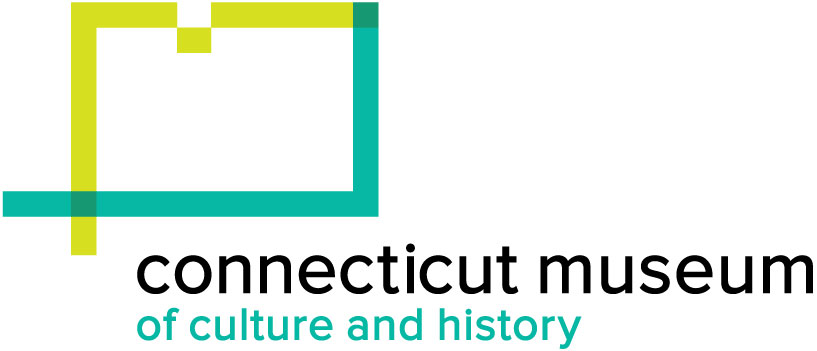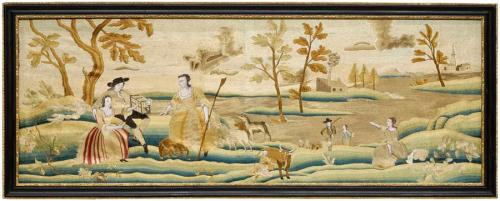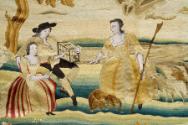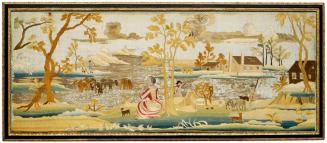Overmantel
EmbroidererAttributed to
Faith Trumbull
(American, 1743 - 1775)
Frame MakerFrame made by
Unknown
English frame maker
After a work byAfter a work by
Nicolas Lancret
(French, 1690 - 1743)
After a work byAfter a work by
Francesco Zuccarelli
(Italian, 1702 - 1788)
After a work byAfter a work by
Nicholaas Pietersz Berchem
(Dutch, 1620 - 1683)
After a work byAfter a work by
Cornelis Visscher
(Dutch, 1629 - 1658)
Date1761
MediumEmbroidery: silk thread, mica and paint on a satin-woven silk ground
Frame: black and gilt wood, original glass
DimensionsPrimary Dimensions (embroidery height x width): 19 x 52in. (48.3 x 132.1cm)
Component (frame height x width): 21 1/4 x 54 7/8in. (53.8 x 139.4cm)
Other (height x width inside frame): 18 1/4 x 51 1/4in. (46.4 x 130.2cm)
ClassificationsTextiles
Credit LineBequest of Frederick Jabez Huntington
Object number1925.1.3
DescriptionOvermantel needlework picture worked in shades of blue-green, dark medium and light green, gold, cream, khaki, medium and light brown, grey, dark red, red and black, and, medium and light blue silk threads, silver metallic threads, mica, and gouache on a black, satin-woven silk ground. The picture shows a pastoral scene in a wide landscape, with three vignettes described here from left to right. The first vignette is in the left foreground; it consists of a seated woman in a red striped dress, next to a man holding a square birdcage. To the right is a shepherdess surrounded by a sheep and four additional animals, possibly a dog or other sheep. The second vignette consists of a young woman milking a cow; the cow is facing the viewer. The third vignette consists of a woman and a shepherd next to three sheep and a goat, all standing on the shore of a large lake in the middle distance. The vignettes are not all drawn to scale. In the right center distance is a saltbox-style house with mica windows. In the right far distance of the landscape is a small gown, including a church with steeple and two small buildings. Various trees decorate the landscape. The picture is completely embroidered to cover the black ground, except for the bird catcher’s hat, pants, and shoes.
The ground consists of a black satin-woven silk that is stretched horizontally in the war direction. The ground has selvedges on top and bottom edges; each selvedge contains four flat-metal wire warp threads. The embroidery is joined to the stretcher (original) by lacing the ground around the back of the stretcher. The embroidery is in the original frame.
Stitches: The principal stitch on the needlework picture is satin stitch; it also includes encroaching satin, flat, outline, stem, whip, seed, split, and couching.
Condition: The gouache is cracked, but not flaking. The silk thread has moderate to severe fading. The needlework picture has been conserved, retaining the original laced mount, and re-installed in the original frame. The strainer is repaired. The glass is replaced.
The ground consists of a black satin-woven silk that is stretched horizontally in the war direction. The ground has selvedges on top and bottom edges; each selvedge contains four flat-metal wire warp threads. The embroidery is joined to the stretcher (original) by lacing the ground around the back of the stretcher. The embroidery is in the original frame.
Stitches: The principal stitch on the needlework picture is satin stitch; it also includes encroaching satin, flat, outline, stem, whip, seed, split, and couching.
Condition: The gouache is cracked, but not flaking. The silk thread has moderate to severe fading. The needlework picture has been conserved, retaining the original laced mount, and re-installed in the original frame. The strainer is repaired. The glass is replaced.
Label TextIn this overmantel, the milkmaid and cow have shrunk to tiny
figures in the center foreground, and the red-and-gold lady has been
joined by a male suitor and an elegant shepherdess. This picture is both
technically and compositionally ambitious and is based on two
European works, a French scene of the 1730s and an Italian scene of the
1750s. Faith’s individual touches include buckled shoes, the man’s tight
knee breeches and black hat, the women’s hairstyles and dress colors, and
the distant village vignette, centered on what looks like an eighteenth-century
Connecticut meeting house.
This overmantel is worked on black silk, requiring almost the entire
surface (nearly 1,000 square inches) to be completely covered with
stitching. Only the black shoes and the man’s black breeches and hat are
left unstitched and unpainted.
NotesSource Note: The image of a bird catcher and shepherdess is taken from an engraving titled "Les Amours Du Bocage" by N. de LArmessin after Nicolas Lancret. The image of the shepherds by the lake is taken from an engraving of "Landscape with Shepherds" after Zucarelli (1702-1788). The milking scene is taken from an engraving of a milking scene by Cornelis Visscher after Nicolaas Berghem (1620-1686). These design sources are discussed in Nancy Graves Cabot, "Engravings As Pattern Sources, I, Embroideries of Three Faith Trumbulls" in The Magazine Antiques (December 1950), p. 477, fig. 54. (Hunt 8/28/2007)figures in the center foreground, and the red-and-gold lady has been
joined by a male suitor and an elegant shepherdess. This picture is both
technically and compositionally ambitious and is based on two
European works, a French scene of the 1730s and an Italian scene of the
1750s. Faith’s individual touches include buckled shoes, the man’s tight
knee breeches and black hat, the women’s hairstyles and dress colors, and
the distant village vignette, centered on what looks like an eighteenth-century
Connecticut meeting house.
This overmantel is worked on black silk, requiring almost the entire
surface (nearly 1,000 square inches) to be completely covered with
stitching. Only the black shoes and the man’s black breeches and hat are
left unstitched and unpainted.
Historical Note: Faith Trumbull was the daughter of Jonathan Trumbull, the Governor of Connecticut from 1769-1784. It is believed that she embroidered this piece in about 1761 while in school in Boston. The picture retains its original frame, which corresponds exactly to the dimensions of a frame that Faith Trumbull's father asked her brother, Joseph, to purchase in London in 1764. The frame has been refinished and the glass has been replaced.
Status
Not on view


















